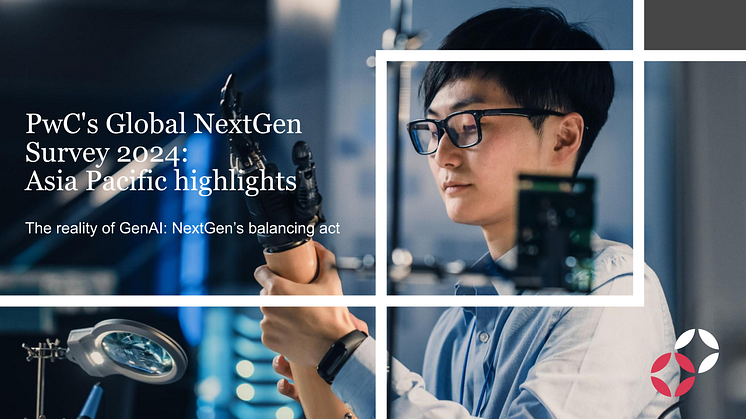
Press release -
COVID-19 proves to be double-edged sword for family businesses in Asia Pacific and Asean: PwC
PwC’s NextGen Survey 2022 Asia Pacific and ASEAN highlights
- 43% of the next generation of family business leaders surveyed in Asia Pacific are more committed to their business than before the pandemic
- 67% recognise that their business has a responsibility to fight climate change and its related consequences
- Only 12% say they emphasise cyber security and privacy as a priority for their family business.
For immediate release - SINGAPORE, 22 June 2022 – For many family businesses, getting through the COVID-19 crisis was the glue that banded them together across generations, around a common purpose. According to PwC’s NextGen Survey 2022 Asia Pacific and ASEAN highlights, 43% of the next generation (NextGen) of family business leaders surveyed in Asia Pacific (ASEAN: 48%; Global: 43%), say they feel more committed to the business than they did prior to the pandemic and that they are now more involved in the business.
In addition, over a third, 35% (ASEAN: 30%; Global: 36%), believe that communication between family members about the business increased during the pandemic. For some family businesses, the pandemic has also accelerated succession planning according to around a quarter of the NextGens surveyed in APAC (22%; ASEAN: 25%), which led to more NextGens stepping up in their roles in their family businesses.
On the flipside, the survey also found that the uncertainty created by the pandemic appears to have made the current generation less likely to relinquish control and more difficult for NextGens to establish themselves. Only 15% (ASEAN:16%) of APAC NextGens say COVID-19 led to them being asked to lead on specific projects, in line with the global average of 14%.
Ng Siew Quan, Asia Pacific Entrepreneurial and Private Business Leader, PwC Singapore said: “Robust succession planning is essential for the family business. NextGen leaders have become more engaged and committed to the business – the challenge is to build confidence between the current and next generation. Our survey shows that communication has increased and this is a good basis for a new generational contract. This is the time to flesh out succession plans and to define the leadership skills required to deliver growth in the future, the key benchmarks on the route to succession, and what NextGens must do to demonstrate they are ready to take the reins. That way the current generation can transition to a supporting or mentoring role with greater confidence.”
This year’s survey also reveals that the majority of NextGens are aware of climate change being one of the key challenges their generation will face and that they understand the vital link between environment, social and governance (ESG) concerns and growth. 67% of NextGens surveyed in Asia Pacific (ASEAN: 69% Global: 71%) recognise that their business has a responsibility to fight climate change and its related consequences. In addition, 56% surveyed in Asia Pacific (ASEAN: 55%; global 64%) say they see opportunity for their business to lead the way in sustainable business practices, while more than half (APAC: 57%; ASEAN:61%; Global: 55%) agree that there should be an increase in focus and efforts to make this shift a reality.
Ng Siew Quan, Asia Pacific Entrepreneurial and Private Business Leader, PwC Singapore said: “It is difficult for a family business to survive multiple generations, regardless of size or geographical location. The NextGen members we spoke with in the Asia Pacific region, like the current generation, understand the fundamental need for growth to create value for future generations. However, encouragingly, Asia Pacific NextGen leaders are ready to challenge the status quo of their family businesses and take a more proactive approach to take a lead in building an ESG strategy and reimagine their family business’ sustained success.”
While being focused on digital skills and new technology proved invaluable to surviving and emerging stronger from the pandemic, only 12% of APAC NextGens (Global: 15%) say they emphasise cyber security and privacy as a priority for their family business.
ENDS
Notes to editor
About the PwC Global NextGen Survey 2022
The NextGen Survey is a global market survey among next generation members in family businesses across 68 territories. The goal of the survey is to better understand what the NextGen are thinking about key issues and the role they are playing, and think they should be playing, in the family business. The survey was conducted online between 8 October and 12 December 2021. Of these respondents, over one-third of the respondents came from the Asia Pacific and ASEAN region.
Related links
Topics
Categories
About PwC
At PwC, our purpose is to build trust in society and solve important problems. We’re a network of firms in 156 countries with over 295,000 people who are committed to delivering quality in assurance, advisory and tax services. Find out more and tell us what matters to you by visiting us at www.pwc.com.
PwC refers to the PwC network and/or one or more of its member firms, each of which is a separate legal entity. Please see www.pwc.com/structure for further details.
© 2022 PwC. All rights reserved.




